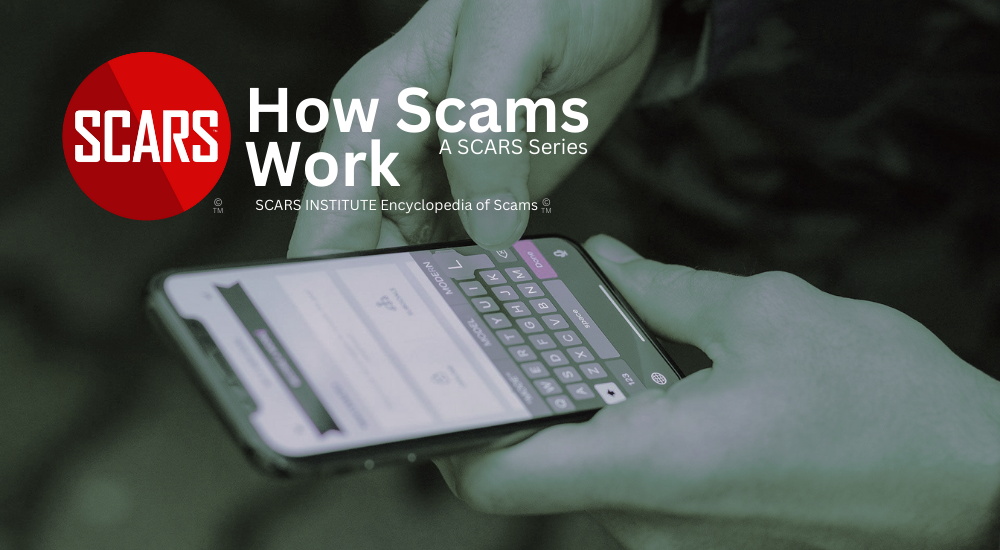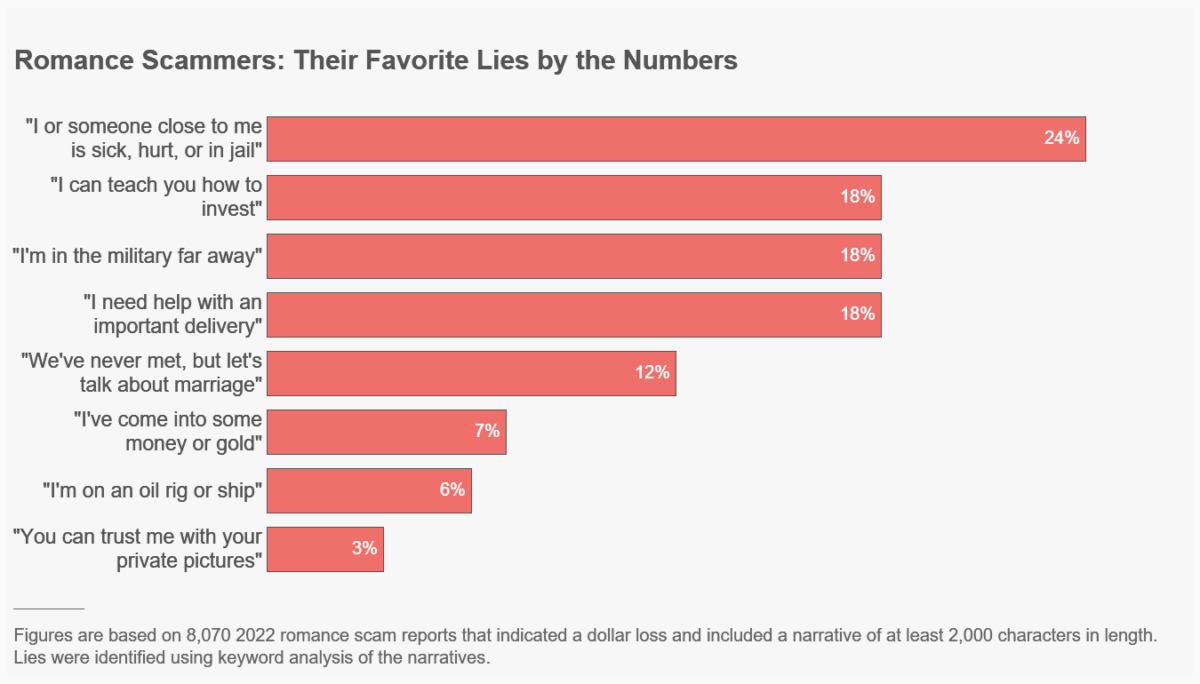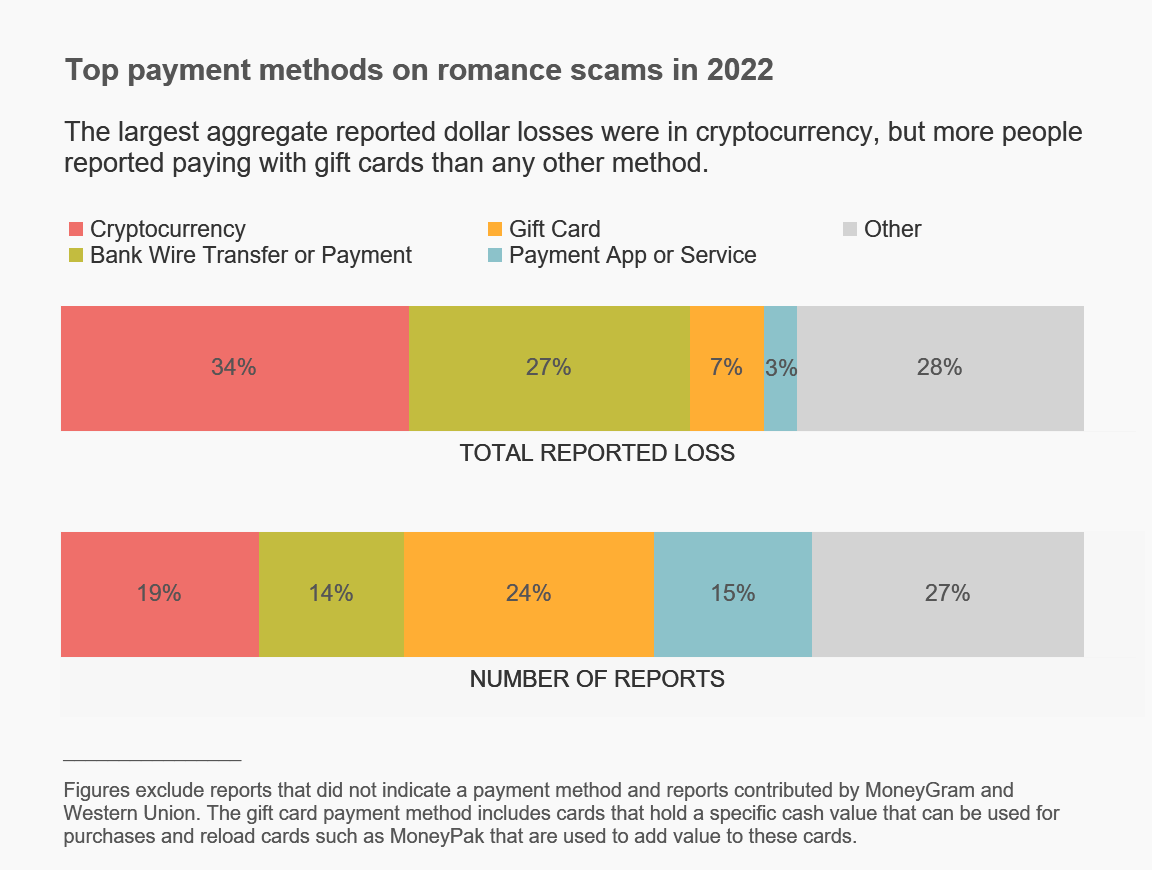
SCARS Institute’s Encyclopedia of Scams™ Published Continuously for 25 Years

Author:
• Tim McGuinness, Ph.D., DFin, MCPO, MAnth – Anthropologist, Scientist, Director of the Society of Citizens Against Relationship Scams Inc.
Originally Published: 2022 – Article Updated: 2024
SCARS Encyclopedia of Scams Article Abstract
Romance scammers employ elaborate lies and stories to manipulate their victims, ultimately aiming to extract money or personal information. According to new FTC data, nearly 70,000 people reported being victims of romance scams in 2022, with losses totaling $1.3 billion.
Scammers build trust by fabricating compelling narratives about their lives, often claiming to be in distant or dangerous situations, such as military service or working on an offshore oil rig, to explain why they cannot meet in person. They exploit their victims’ emotions by creating scenarios that elicit sympathy, such as needing money for a sick relative or urgent legal fees.
By creating a false sense of intimacy and exclusivity, scammers manipulate victims into continuing the relationship, making it harder for them to recognize the scam. The lies extend to promises of financial investments, where victims are duped into sending money, often through cryptocurrency, which is harder to trace. The FTC’s findings highlight the importance of being cautious in online relationships, especially with individuals who request money or personal information without ever meeting in person.

New FTC Data Reveals Top Lies Told by Romance Scammers
Why Do Romance Scammers Lie or Tell Stories to Groom and Manipulate Their Victims?
Romance scams are a form of online fraud that targets individuals. Sometimes they are looking for love or companionship, sometimes not. Romance scammers often create fake profiles on dating websites or social media, posing as potential partners, and use lies and stories to groom and manipulate their victims into ultimately sending them money or personal information. The reasons why these romance scammers lie are many, but they all boil down to one ultimate goal: to extract money from their victims.
The first reason why romance scammers lie is to create a sense of trust and emotional connection with their victims. By telling stories about their life, their background, and their interests, romance scammers aim to build a rapport with their victims and gain their trust – this is part of the grooming process. They often claim to be working overseas, in the military, or in another country, which can help explain why they are unable to meet in person. By building a relationship with their victims, romance scammers can manipulate them into being controlled and sending money or revealing personal information, such as their social security number, bank account information, or credit card details.
Another reason why romance scammers lie is to increase their victims’ sympathy and compassion – this is a form of emotional hijack that serves to better control the victim. They often pretend to be in a difficult situation, such as needing money to pay for medical bills, travel expenses, or legal fees. By tapping into their victims’ emotions and exploiting their compassion, romance scammers can convince their victims to send money, even when the requests become increasingly unreasonable. Romance scammers may also claim to be in danger or in need of urgent assistance, which can further increase their victims’ sense of urgency and make them more likely to send money.
A third reason why romance scammers lie is to establish a false sense of intimacy and exclusivity. Romance scammers often target individuals who are vulnerable and will exploit those vulnerabilities as part of their manipulation. By claiming to be the perfect match, scammers can make their victims feel special and unique, exploiting cognitive biases and vulnerabilities. They may also claim to be in love with their victims (using amygdala hijacks as a control mechanism,) which can make it difficult or impossible for the victims to end the relationship, even when others tell them they are being scammed. This false sense of intimacy can make it easier for romance scammers to manipulate their victims into sending money or providing personal information.
Finally, romance scammers lie because they believe it is an easy and effective way to make money, which based on their success proves to be very true. Many romance scammers are part of organized criminal groups or work in call centers where they are professionally trained to use very effective psychological tactics to extract money from victims. They know that individuals looking for love or companionship are often more susceptible to emotional manipulation and are less likely to suspect they are being scammed, but in truth, anyone can be scammed. By lying and telling stories, romance scammers can keep their victims engaged and extract money from them over a long period of time.
Romance scammers lie and tell stories to groom and manipulate their victims for financial gain. By creating a sense of trust, sympathy, intimacy, and exclusivity, scammers can exploit their victims’ emotions and make it easier for them to extract money. It is important for individuals to be aware of these scams and to protect themselves by never trusting anyone that they meet online and never sending money or revealing personal information to someone they have not met in person. By adopting a more risk-avoidance set of behaviors and being cautious and skeptical of online relationships, individuals can protect themselves from falling victim to these types of romance or relationship scams.
FTC Data Spotlight also Shows a Large Increase in ‘Sextortion’ as a Tool for Romance Scammers
NOTE: SCARS is an FTC sentinel reporting partner through the SCARS|CDN Cybercrime Data-Reporting Network and www.Anyscam.com
If you are a victim of a scam or sextortion please visit www.ScamVictimsSupport.org
FTC Romance Scammers Data
New data released by the United States Federal Trade Commission sheds new light on the lies (stories) that romance scammers use to take advantage of people—lies that reports to the FTC show cost nearly 70,000 consumers $1.3 billion in 2022. [REMEMBER: the U.S. government data is based only on what is reported to them. Since about 1% is reported, multiply their numbers by 100]
Romance scammers tell all sorts of lies to steal your heart and money, and reports to the FTC show those lies are working. Last year’s romance scam numbers looked a lot like 2021 all over again, and it’s not a pretty picture. In 2022, nearly 70,000 people reported a romance scam and reported losses hit a staggering $1.3 billion. The median reported loss: $4,400 – this has dropped significantly since the 2019 number of $9,600.
These scammers pay close attention to the information you share and don’t miss a beat becoming your perfect match. You like a thing, so that’s their thing, too. You’re looking to settle down. They’re ready too. But there is one exception – you want to meet in real life, and they can’t. Reports show their excuse is often baked right into their fake identity. Claiming to be on a faraway military base is the most popular excuse, but “offshore oil rig worker” is another common (and fake) occupation. In short, there’s no end to the lies romance scammers will tell to get your money.
Using data from the FTC’s Consumer Sentinel Network, the new data spotlight breaks down the most common lies that victims have reported being told when they were contacted by romance scammers while being groomed and manipulated in 2022.
Topping the list was scammers telling consumers that they needed money because a friend or relative was sick, hurt, or in jail – a lie consumers reported hearing in nearly a quarter of reports. The next most commonly reported lie was that the scammer had great investment advice to share with their newfound romantic interest, followed closely by the lie that the scammer was in the military, or that they needed help in making some sort of important delivery.
More About Romance Scammers
Reports show romance scammers often use dating apps to target people looking for love. But reports of romance scams that start with unexpected private messages on social media platforms are even more common. In fact, 40% of people who said they lost money to a romance scam last year said the contact started on social media; 19% said it started on a website or app. Many people reported that the scammer then quickly moved the sweet talk to WhatsApp, Google Chat, or Telegram.
You may have heard about romance scammers who tell you they’re sick, hurt, or in jail – or give you another fake reason to send them money. But did you know that many romance scammers operate by offering to do you a favor? They may claim to be a successful cryptocurrency investor who’ll teach you how it’s done. But any money you “invest” goes straight into their wallet. In another twist, they might say they’ve shipped you a valuable package (not true), which requires you to send money for “customs” or some other made-up fee. It’s all a lie. You send the money, and the package never turns up.
The spotlight notes these reports have increased more than eightfold in the past three years, with consumers ages 18-29 six times more likely than older consumers to report this form of romance scams. This is largely, because of relationship/investment scams that involve cryptocurrency – Pig Butchering scams.
According to the spotlight, consumers most often report being contacted by romance scammers via social media, though they often push to move their chats or communications to other messaging apps. Consumers also reported losing more money by sending cryptocurrency than any other method.
—
How They Take Your Money
The way romance scammers take your money is another important piece of the story. People reported sending more money to romance scammers using cryptocurrency and bank wires than any other method: together, they accounted for more than 60% of reported losses to romance scams in 2022. While not the costliest payment method, gift cards were the most frequently reported – 24% of people who reported losing money to a romance scam in 2022 said it was taken using gift cards.
Sextortion
Reports also show that scammers who convince you to share explicit photos will then threaten to share them with your social media contacts. It’s called sextortion, and these reports have increased more than eightfold since 2019. People aged 18-29 were over six times as likely to report sextortion than people 30 and over. About 58% of 2022 sextortion reports identified social media as the contact method, with Instagram and Snapchat topping the list.
The data spotlight also highlights a growing tactic used by romance scammers: sextortion, when a romance scammer convinces a consumer to share explicit photos and then threatens to share those photos with the consumer’s social media contacts.
Spotting Romance Scammers
So how can you spot a romance scammer in the act?
- Nobody legit will ever ask you to help—or insist that you invest— by sending cryptocurrency, giving the numbers on a gift card, or wiring money. Anyone who does is a scammer.
- If someone tells you to send money to receive a package, you can bet it’s a scam.
- Talk to friends or family about a new love interest and pay attention if they’re concerned.
- Try a reverse image search of profile pictures. If the details don’t match up, it’s a scam.
- Also, beware of scam investigators or money recovery scammers – you do not need to pay anyone for these services – your local police will do them of free.
How To Report/Where To Report?
If you lost money: the way to report this is FIRST with your LOCAL POLICE – they are your first responders, and will be the ones to recover your money if at all possible!
Then report to:
- U.S. Secret Service – the Secret Service wants to talk to you
- Find the nearest U.S. Secret Service Field Office to you
https://www.secretservice.gov/contact/field-offices - Crypto Scams can also be reported by email to: CryptoFraud@SecretService.gov
- Victims who require further assistance may call 1-888-813-USSS
- Deaf and hard of hearing 202-406-5370
- Find the nearest U.S. Secret Service Field Office to you
- U.S. Federal Trade Commission at https://reportfraud.ftc.gov/#/?orgcode=SCARS – the FTC will send a copy of your report to the FBI, so you don’t have to bother.
- SCARS on www.Anyscam.com – for worldwide distribution.
♦ NEVER REPORT YOUR CRIME TO ANY PRIVATE FOR-PROFIT COMPANY – THEY ARE ONLY INTERESTED IN EXPLOITING YOU
You can find more places to report here: reporting.AgainstScams.org
SCARS Romance Scam Life Cycle Webinar
-/ 30 /-
What do you think about this?
Please share your thoughts in a comment below!
Table of Contents
- Insights from the U.S. Federal Trade Commission
- SCARS Encyclopedia of Scams Article Abstract
- New FTC Data Reveals Top Lies Told by Romance Scammers
- Why Do Romance Scammers Lie or Tell Stories to Groom and Manipulate Their Victims?
- FTC Data Spotlight also Shows a Large Increase in ‘Sextortion’ as a Tool for Romance Scammers
- FTC Romance Scammers Data
- More About Romance Scammers
- How They Take Your Money
- Sextortion
- Spotting Romance Scammers
- How To Report/Where To Report?
- SCARS Romance Scam Life Cycle Webinar
LEAVE A COMMENT?
Thank you for your comment. You may receive an email to follow up. We never share your data with marketers.
Recent Comments
On Other Articles
- on Finally Tax Relief for American Scam Victims is on the Horizon – 2026: “I just did my taxes for 2025 my tax account said so far for romances scam we cd not take…” Feb 25, 19:50
- on Reporting Scams & Interacting With The Police – A Scam Victim’s Checklist [VIDEO]: “Yes, this is a scam. For your own sanity, just block them completely.” Feb 25, 15:37
- on Danielle Delaunay/Danielle Genevieve – Stolen Identity/Stolen Photos – Impersonation Victim UPDATED 2024: “She goes by the name of Sanrda John now” Feb 25, 10:26
- on Reporting Scams & Interacting With The Police – A Scam Victim’s Checklist [VIDEO]: “So far I have not been scam out of any money because I was aware not to give the money…” Feb 25, 07:46
- on Love Bombing And How Romance Scam Victims Are Forced To Feel: “I was love bombed to the point that I would do just about anything for the scammer(s). I was told…” Feb 11, 14:24
- on Dani Daniels (Kira Lee Orsag): Another Scammer’s Favorite: “You provide a valuable service! I wish more people knew about it!” Feb 10, 15:05
- on Danielle Delaunay/Danielle Genevieve – Stolen Identity/Stolen Photos – Impersonation Victim UPDATED 2024: “We highly recommend that you simply turn away form the scam and scammers, and focus on the development of a…” Feb 4, 19:47
- on The Art Of Deception: The Fundamental Principals Of Successful Deceptions – 2024: “I experienced many of the deceptive tactics that romance scammers use. I was told various stories of hardship and why…” Feb 4, 15:27
- on Danielle Delaunay/Danielle Genevieve – Stolen Identity/Stolen Photos – Impersonation Victim UPDATED 2024: “Yes, I’m in that exact situation also. “Danielle” has seriously scammed me for 3 years now. “She” (he) doesn’t know…” Feb 4, 14:58
- on An Essay on Justice and Money Recovery – 2026: “you are so right I accidentally clicked on online justice I signed an agreement for 12k upfront but cd only…” Feb 3, 08:16
ARTICLE META
Important Information for New Scam Victims
- Please visit www.ScamVictimsSupport.org – a SCARS Website for New Scam Victims & Sextortion Victims
- Enroll in FREE SCARS Scam Survivor’s School now at www.SCARSeducation.org
- Please visit www.ScamPsychology.org – to more fully understand the psychological concepts involved in scams and scam victim recovery
If you are looking for local trauma counselors please visit counseling.AgainstScams.org or join SCARS for our counseling/therapy benefit: membership.AgainstScams.org
If you need to speak with someone now, you can dial 988 or find phone numbers for crisis hotlines all around the world here: www.opencounseling.com/suicide-hotlines
A Note About Labeling!
We often use the term ‘scam victim’ in our articles, but this is a convenience to help those searching for information in search engines like Google. It is just a convenience and has no deeper meaning. If you have come through such an experience, YOU are a Survivor! It was not your fault. You are not alone! Axios!
A Question of Trust
At the SCARS Institute, we invite you to do your own research on the topics we speak about and publish, Our team investigates the subject being discussed, especially when it comes to understanding the scam victims-survivors experience. You can do Google searches but in many cases, you will have to wade through scientific papers and studies. However, remember that biases and perspectives matter and influence the outcome. Regardless, we encourage you to explore these topics as thoroughly as you can for your own awareness.
Statement About Victim Blaming
SCARS Institute articles examine different aspects of the scam victim experience, as well as those who may have been secondary victims. This work focuses on understanding victimization through the science of victimology, including common psychological and behavioral responses. The purpose is to help victims and survivors understand why these crimes occurred, reduce shame and self-blame, strengthen recovery programs and victim opportunities, and lower the risk of future victimization.
At times, these discussions may sound uncomfortable, overwhelming, or may be mistaken for blame. They are not. Scam victims are never blamed. Our goal is to explain the mechanisms of deception and the human responses that scammers exploit, and the processes that occur after the scam ends, so victims can better understand what happened to them and why it felt convincing at the time, and what the path looks like going forward.
Articles that address the psychology, neurology, physiology, and other characteristics of scams and the victim experience recognize that all people share cognitive and emotional traits that can be manipulated under the right conditions. These characteristics are not flaws. They are normal human functions that criminals deliberately exploit. Victims typically have little awareness of these mechanisms while a scam is unfolding and a very limited ability to control them. Awareness often comes only after the harm has occurred.
By explaining these processes, these articles help victims make sense of their experiences, understand common post-scam reactions, and identify ways to protect themselves moving forward. This knowledge supports recovery by replacing confusion and self-blame with clarity, context, and self-compassion.
Additional educational material on these topics is available at ScamPsychology.org – ScamsNOW.com and other SCARS Institute websites.
Psychology Disclaimer:
All articles about psychology and the human brain on this website are for information & education only
The information provided in this article is intended for educational and self-help purposes only and should not be construed as a substitute for professional therapy or counseling.
While any self-help techniques outlined herein may be beneficial for scam victims seeking to recover from their experience and move towards recovery, it is important to consult with a qualified mental health professional before initiating any course of action. Each individual’s experience and needs are unique, and what works for one person may not be suitable for another.
Additionally, any approach may not be appropriate for individuals with certain pre-existing mental health conditions or trauma histories. It is advisable to seek guidance from a licensed therapist or counselor who can provide personalized support, guidance, and treatment tailored to your specific needs.
If you are experiencing significant distress or emotional difficulties related to a scam or other traumatic event, please consult your doctor or mental health provider for appropriate care and support.
Also read our SCARS Institute Statement about Professional Care for Scam Victims – click here to go to our ScamsNOW.com website.


















Thank you for the valuable information and telling us we just have to report it to the FTC, because the FBI will get it. I was contacted by the Secret Service in my scam because 20 other people were affected by the large cybercrime. I did receive some money back because they had the money order receipts and the lawyers were able to figure out who received what money. It was $18,000 dollars; however, I was lucky to get some of it back.
I am at this point right now that I want to understand what about me helped identify me to the criminal(s). I am working with my therapist and I am thankful for her. She has increased my appointments to twice a week. I had a major red flag from the section on how to spot a scammer – the criminal insisted that they only way I could help them was to send gift cards. That was the money vehicle of choice especially after Paypal wasn’t working the way they wanted. CashApp and Paypal were the first two platforms the criminal tried to work with. They had this intricate method for being able to forward payment to other Paypal accounts that involved me having two separate Paypal ID’s and creating a request for money to one ID (invoice) and then having that ID pay the money that would end up in the Paypal account to “a person on the management team”. Of course now I know these women were money mules. The other red flag was the insistence of no photograph. The profile picture was always blank but they would label their profile with the NAME of the person they were impersonating. So I couldn’t do a reverse image lookup. When phone calls to me came through I did try to do a reverse lookup but it was inconclusive. Oh! I just remembered, the criminal stated so many times they wanted to escape from their management team as they felt that they were only a cash mule for their management. I asked the criminal why they were at the age of 88 still working and making personal appearances for any event that paid. The answer was that there never was a reason prior to me to want to retire. But as much as the criminal would tell me how devious their management team was and how dirty they made the criminal feel, if I made a remark about the team being connected to scammers (revealed in trying to make the cash transfers to a team member) the criminal would ALWAYS stick up for their “team”.
Excellent guide
My PBS started with them telling me “I will teach you how to trade Bitcoin”. Another claimed they needed funding to collect an inheritance, while another wanted money for traveling expenses so we could be together.